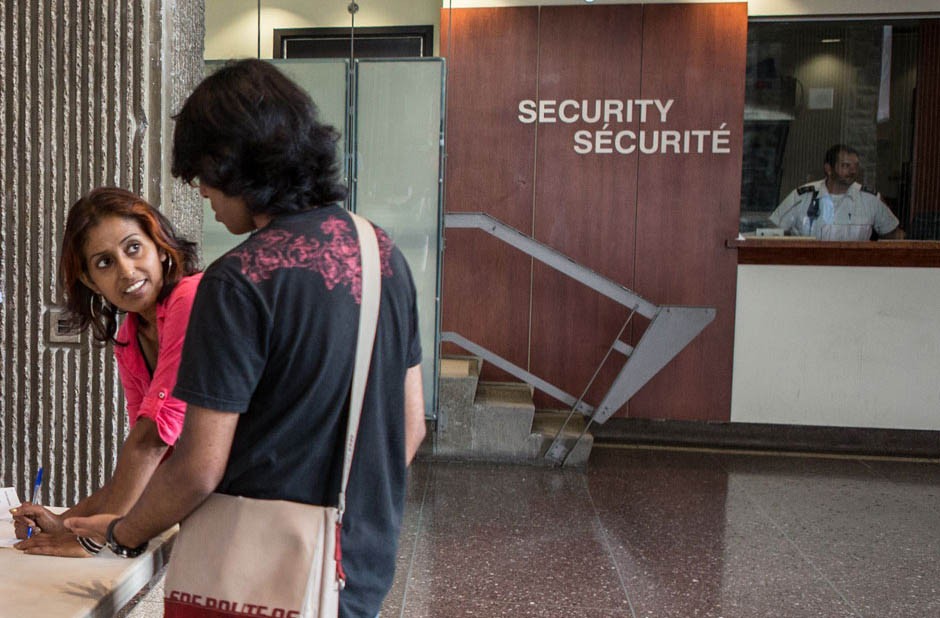Using prevention and training to serve Concordians

With more than 50,000 students and 6,300 faculty and staff regularly circulating on Concordia’s two campuses — plus thousands of passersby on their way to and from the metro and other destinations — keeping Concordians safe is a major task. That’s the role of Concordia’s Security department.
“We provide our community with a safe environment that is suitable for learning and research,” says Jacques Lachance, director of Security.
“We help maintain safe academic and social activities. We respond to all kinds of incidents and emergencies. We are always around when somebody reports a situation that can affect a member of the community or incidents in classrooms, at special events or involving research,” he says.
Security’s services fall under two distinct categories.
“The first involves operations, emergency measures and fire prevention,” Lachance reports.
“Operations include our officers in uniform. We manage the 3717 extension — the campus number for 911 calls. We also have 13 service desks, with most of them occupied 24 hours a day, seven days a week, 365 days a year,” he says.
“We also have security patrols on both campuses able to quickly respond to any incident. Our aim is to respond to any emergency call anywhere on the campus in less than four minutes with three agents, to provide immediate response and support the incoming external emergency services.”
Security manages emergency operations during interruptions caused by such occurrences as water leaks, power shortages and building emergencies. “This happens about 20 times per year,” Lachance reports. “We also are involved with the university’s security both at the on-site incident command post as well as in the Emergency Operation Centre.”
As well, the sector is responsible for fire-prevention activities. “We provide training to more than 450 Concordia emergency responders team members (CERT), who help respond to alarms or evacuate the buildings,” he says. “The CERTs can be either faculty members, staff or students volunteers.”
We provide our community with an environment that is suitable for learning and research
Lachance explains that Security’s second major function “is to offer support to the university community on event-related security.” The team includes events analysts, investigators, technical service coordinators, prevention and training coordinators and administrative employees.
“We have analysts who give advice to departments, students or others who are holding events at Concordia. Our integrated security system coordinator manages all physical security devices on campus, such as cameras, card readers, emergency phones, etc. The coordinator also works with architects and project managers on most of the renovation and construction projects,” he says.
“And we have two full-time investigators who work with the Office of Rights and Responsibilities and other departments. They investigate reported cases and link to the police, the courts or internal services, if necessary.”
New measures during the year
“We added some important measures in 2018-19,” Lachance reports.
Security bought and installed a new software, Omnigo, which helps manage incident reports, filing systems and call dispatching.
“We created a new and second function: service support,” Lachance says. “We hired new personnel, including an investigator with more than 35 years of related experience; an emergency measures coordinator; and a coordinator for internal training and on-the-job training for our officers. With their help, we multiplied our internal staff training by a factor of six and gave more than 1,837 individual training sessions.”
Importantly, Security moved into new premises in the Henry F. Hall Building. “That was something,” Lachance says. “We were waiting to move for a long time. It gave us a new Emergency Operations Centre and a centralized departmental office, which allows us to better follow up on emergencies and ensure continuity of operations.”
“On physical security, we assisted on multiples projects, such as the Applied Science Hub on the Loyola Campus and the Henry F. Hall Building renovations on the Sir George Williams Campus,” he says. “Security also improved access controls to individual washrooms in several Sir George Williams buildings. We carried on with the installation of the Alertus app to transmit alerts in case of emergency in major buildings.”
The unit enhanced its ties with university partners. “We also improved our relationship with external partners such as Montreal’s Place des Arts for the university’s convocation ceremonies, the Montreal police and the YWCA, which is across the street from the Visual Arts Building.”
Ultimately, these steps were taken with one overriding aim, Lachance says. “In all, our goal is to ensure that our community can enjoy a safe environment.”



